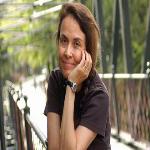May 02, 2011

Photo: Ha Lam
Palestinian-American poet Naomi Shihab Nye
Naomi Shihab Nye is an award-winning Palestinian-American poet who has written or edited nearly 30 books and published five collections of poems for both adults and young people.
For Naomi Shihab Nye, poetry is at once deeply spiritual and fully of this world. Today she wears a handmade bracelet sent by an admirer. It's inscribed with a question from one of her poems: "What songs travel toward us, from far away, to deepen our days?" She describes how poetry is like a bracelet.
"I think poetry wants to wrap around us, and I think it does if we allow it to. There is a sense of being held by a poem when you read a poem you love. It's not as if you are just appreciating it intellectually. It is as if it has wrapped itself around your spirit or your heart or your memory and it belongs to you in a much more intimate way."
Nye was born in 1952 in Saint Louis, Missouri, after her father's Palestinian family lost its home as a result of the1948 war which led to the creation of Israel. She says a sense of exile and longing cast a shadow over her girlhood and accounts for her lifelong devotion to social justice.
She credits her father and her American mother with teaching her about poetry's power to comfort and awaken. She recalls a poem by Rachel Field called "Some People," which had a profound impact upon her as a child.
Isn't it strange some people make
You feel so tired inside,
Your thoughts begin to shrivel up
Like leaves all brown and dried!
But when you're with some other ones,
It's stranger still to find
Your thoughts as thick as fireflies
All shiny in your mind!
"For a seven year-old, that made sense already because I knew here were dull people and there were glittering voices and people you wanted to be around because of the way they spoke and what they talked about," she says. "And I remember thinking ‘I may need that poem in the future. I better memorize it.'"?
Nye began writing her own poetry at the age of six. She says a turning point came when, at age 14, she first met her grandmother, a wise and feisty Palestinian matriarch who lived to be 106. Nye reads a verse from "The Words Under the Words" from "19 Varieties of Gazelle," her collection of poems about the Middle East.
My grandmother's hands recognize grapes
the damp shine of a goat's new skin.
When I was sick they followed me
I woke from the long fever to find them
covering my head like cool prayers...
Readers of Nye's work have noted a similarity between prayer and poetry. "There is a sense that by putting words together something might be listening, some larger spirit, force or essence. The silence might be listening and it's always been enough to know that silence is on the other side of all this chatter."
Nye's persona contains apparent contradictions. For example, she is gregarious and curious about others, but also introspective and craves the solace of solitude. She offers advice to those of like mind in her poem "The Art of Disappearing."?
If they say We should get together say why?
It's not that you don't love them anymore.
You're trying to remember something
too important to forget.
Trees. The monastery bell at twilight. Tell them
you have a new project.
It will never be finished.
When someone
recognizes you in a grocery store
nod briefly and become a cabbage.
Nye says she would never want to be rude.
"And by the way, that poem has made some people mad. However, it has also made some young readers like of the middle school age really talk to me about time. ‘Well how do you see time at your age?' ‘What do you mean at the end of that poem ‘know you could tumble at any second?' And I think ever since I was a very little child, I realized that our lives, no matter how long we live, would be very brief in the full scheme of time."
Nye always finds time to speak out publicly against oppression and violence, whether it's the war in Iraq, the plight of the dispossessed, the Palestinian exile, or the terrorist bombings of September 11, 2001. In this verse from her poem "Blood," she writes about her reaction to that day.?
I call my father, we talk around the news.
It is too much for him,
neither of his two languages can reach it.
I drive into the country to find sheep, cows,
to plead with the air.
Who calls anyone civilized?
Where can the crying heart graze?
What does a true Arab do now?
In Nye's view, peace within and peace in the world form a continuum, and feelings that at first appear unrelated are connected. We hear this in an excerpt from her famous poem, "Kindness."?
Before you know kindness as the deepest thing inside,
you must know sorrow as
the other deepest thing.
You must wake up with sorrow.
You must speak to it till your voice
catches the thread of all sorrows
and you see the size of the cloth.
Then it is only kindness that makes sense anymore,
only kindness that ties your shoes
and sends you out into the day to mail letters and purchase bread,
only kindness that raises its head
from the crowd of the world to say
it is I you have been looking for,
and then goes with you everywhere
like a shadow or a friend.